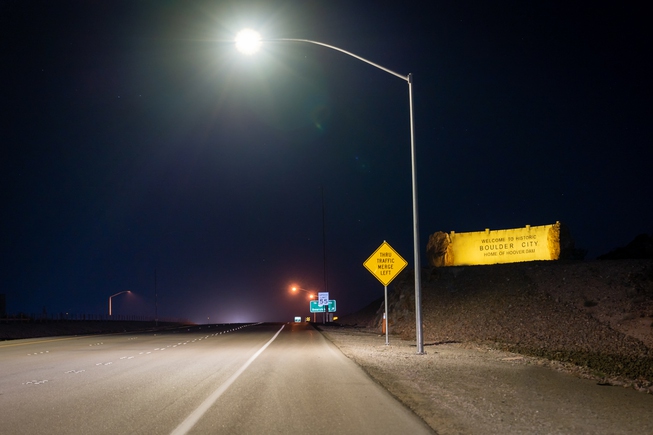
Boulder City was awarded a $1.9 million grant from the U.S. Economic Development Authority to update the city’s lights fixtures to bulbs that will reduce light pollution.
Saturday, Oct. 8, 2022 | 2 a.m.
Boulder City is spending $1.9 million in federal grant money to dim the city’s street lights, cut down on light pollution and lure star gazers.
The city is using the U.S. Economic Development Authority grant to update the city’s light fixtures with bulbs that produce a “warmer” light compared with the city’s current LED lights.
Boulder City officials said the new lights will bolster dark-sky tourism and protect nocturnal wildlife such as bats, owls and black-tailed jackrabbits.
Boulder City Councilman James Adams said the move will also help address complaints from residents about the “bright, white lights flooding into people’s bedrooms.”
Ashley Pipkin, a specialist with the National Park Service’s Natural Sounds and Night Skies Division, worked with the city to determine how to best address light pollution and secure the grant.
“Working with communities to improve how to reduce the amount of light pollution they emit out into the environment is a win-win for both night skies, nocturnal environments, national parks and the community members that just want to have better lighting in their community and a more improved environment that makes it more beautiful at night time,” Pipkin said.
Boulder City sits just 30 miles from Las Vegas and the bright lights of the Strip.
Dr. Steffen Lehmann, a professor of architecture at UNLV, said Las Vegas is the brightest city in the world.
The lights shine into the atmosphere, creating a glowing dome that the National Park Service said can be detected up to 200 miles away.
“You have seen many times that famous photo (of) the night view of the U.S. from satellite — you see there’s a lot of light around New York, Boston (and) the East Coast,” Lehmann said. “But then, of course, you see this spot that’s very bright in the desert, which is Vegas.”
The light makes it more difficult to see the stars and can harm wildlife that thrive in the dark, Lehmann said. Nocturnal animals that are used to hunting at night could have their sleep cycles disturbed by this bright light, which could confuse them and even place them at risk of being hunted during the day when they are not used to being awake.
While the bright lights in Las Vegas attract tourists seeking the glitz and glamor of the casinos, Boulder City is looking to cash in on the growing industry of dark sky tourism. Pipkin said that the National Park Service has hosted night-sky programs across the state and local astrological organizations have hosted star-viewing parties, but Boulder City does not have any designated dark sky activities.
“We’ve seen the popularity of those programs in our national parks and many (other) places — state parks, communities,” Pipkin said. “(We) could really see and know that it could be a benefit to Boulder City, too, and be a boon for tourism.”
Boulder City is still working on ways to make full use of the star-filled sky they hope to achieve with this dimming of city lights, according to Adams.
Adams said some people travel to dark places just to “see the sky that they might not be able to see from their home.”
Pipkin said a number of communities in the U.S. West tout so-called astro tourism, such as Borrego Springs, Calif. — which is California’s only certified International Dark Sky Community — or Flagstaff, Ariz. Both areas are known for hosting dark sky parties and offer tourists the opportunity to camp out underneath a starry sky.
Nevada has a “huge swath” of naturally dark skies, said Pipkin, who wants the state to “do more to promote astro-tourism” through projects like Boulder City’s.
Only two places in Nevada hold certifications from the International Dark-Sky Association: Great Basin National Park by the Nevada-Utah border and the Massacre Rim Wildlife Study Area in the northwest corner of the state.
If Boulder City’s designation is approved, it will become Nevada’s first city with an International Dark Sky Certification, city spokeswoman Lisa LaPlante said. To qualify for this designation, the city will have to “show exceptional dedication to the preservation of the night sky” by implementing and enforcing a dark sky ordinance, dark sky education and community support, according to the International Dark-Sky Association.
The lighting upgrade project will start in 2023 and is expected to take a few years to complete, Pipkin said.
“For those people who … want to see the night sky — maybe they are out there visiting Las Vegas for a weekend or whatever — Boulder City is just a quick jump away,” Adams said.
